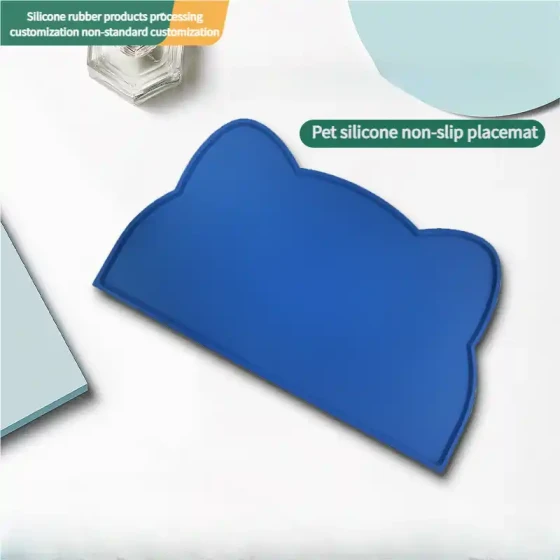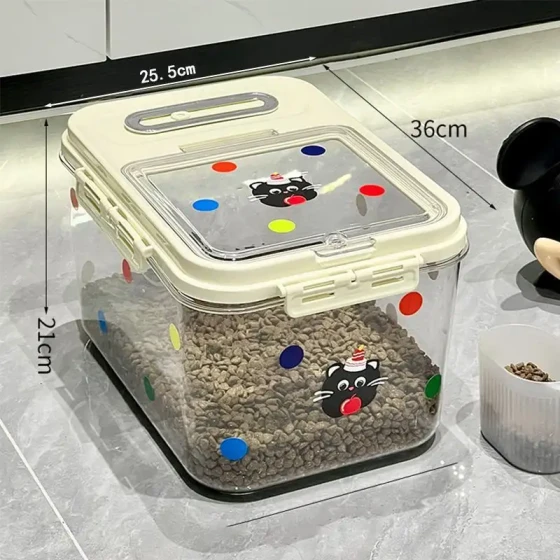What Smells Do Cats Fear Most_These Smells Should Be Avoided
Cat owners may often notice that their feline companions instantly "change expression" when smelling certain odors, showing disgust or even fear, then quickly fleeing the scene. This is because a cat's sense of smell is tens or even hundreds of times more sensitive than humans’. Some odors that seem faint or pleasant to us are like biochemical weapons to their “high-precision radar”! Understanding the smells cats fear can not only help avoid making them uncomfortable but also protect their health, since some odors are not just “unpleasant” to cats but actually “toxic”!

Why Are Cats So Sensitive to Smells?
How powerful is a cat’s sense of smell? To put it simply, humans have about 5 million olfactory cells in their nasal passages, while cats easily possess over 200 million! This means cats can detect subtle scent changes that we completely miss. This super ability is crucial for hunting and recognizing their environment in the wild. Though domestic cats don’t need to hunt like their ancestors, their keen sense of smell remains an important way to understand the world. They use scent to recognize other cats, mark territory, and even judge whether food is fresh and safe.
Besides the developed olfactory cells, cats have a secret weapon—the vomeronasal organ, also called Jacobson’s organ. This special organ located at the roof of a cat’s mouth helps them analyze pheromones in the air more deeply, such as scent markers left by other cats. When you see a cat grimacing as if making a funny face while inhaling, it’s likely activating this “advanced analyzer”!
Because of such a powerful olfactory system, some smells that are harmless or pleasant to humans become strong irritants to cats, causing discomfort or even fear.
The Smells Cats Fear Most—Attention Cat Owners!
Due to cats' sensitive noses, the following several odors are generally avoided by most cats, and some can even be harmful to their health, requiring our special care.
1. Citrus Scents: The “Freshness Bomb” in a Cat’s Nose
Why don’t cats like it? Citrus fruits like lemons, oranges, grapefruit, and tangerines smell refreshing to us, but to cats, the volatile components (such as limonene and coumarin) are extremely pungent. Imagine if your sense of smell were tens of times stronger and you encountered a strong lemon scent—wouldn’t it feel like being hit by a "freshness bomb" too?
Can it cause poisoning? Yes, some components in citrus fruits, especially limonene in the peels, are toxic to cats. Although cats generally avoid the smell, making large ingestion unlikely, accidentally eating the flesh or peel can cause vomiting, diarrhea, drooling, lethargy, and poisoning symptoms, potentially even affecting liver function in severe cases.
How to avoid it? Avoid using cleaning agents, aromatics, or perfumes containing citrus components where cats often hang out. If you have citrus fruits at home, keep them out of your cat’s reach. Some cat repellents use citrus scents, but they only leverage cats' aversion and cannot guarantee complete deterrence; licking may still pose risks.
2. Mint and Certain Essential Oils: Smelling Like “Catnip” But Actually Concealing Danger?
Why don’t cats like it? Except for catnip (which is indeed a “legal stimulant” that most cats love), many other types of mint, like spearmint, have strong odors generally disliked by cats. Additionally, many essential oils have very irritating smells to cats.
Can it cause poisoning? Certain essential oils such as mint, tea tree, eucalyptus, lavender, cinnamon, wintergreen, and sweet birch are toxic to cats. Cats lack the enzymes to break down these plant compounds, and essential oils can be absorbed via skin or inhaled, burdening their liver and causing poisoning. Symptoms include vomiting, drowsiness, unsteady gait, and breathing difficulties.
How to avoid it? Avoid using essential oil diffusers, sprays, cleaning agents, or scented candles with essential oils at home. If you use essential oils, thoroughly wash hands and any possibly contacted items before interacting with cats. Choose pet-safe, natural, unscented air fresheners if needed.
3. Spicy and Certain Seasoning Smells: Making Cats’ Eyes and Noses “Burn”!
Why don’t cats like it? Spices like chili, pepper, cinnamon, and mustard have strong, irritating smells that can stimulate cats’ olfactory and respiratory systems, causing discomfort, sneezing, or coughing. This response acts as a self-protection measure to avoid potentially harmful substances.
Can it cause poisoning? While chili mainly causes a burning sensation, ingredients like garlic, onions, leeks, and chives are toxic to cats. These contain sulfides that destroy red blood cells, causing hemolytic anemia, decreased appetite, vomiting, diarrhea, fatigue, and rapid breathing. Severe cases can be life-threatening.
How to avoid it? Be especially careful during cooking to prevent cats from accessing foods containing garlic or onions, even in small amounts. Do not try using chili water as a cat deterrent, as it causes pain and health risks.
4. Chemical Cleaners: Pungent Smells That Hit Cats Twice
Why don’t cats like it? Cleaners containing bleach, ammonia, phenols, and other strong chemicals usually smell very pungent. Cats’ highly sensitive noses find these chemical odors unbearable “toxic gases.”
Can it cause poisoning? Besides smell irritation, the chemicals in cleaners are toxic to cats. Excessive inhalation may irritate respiratory tracts, causing vomiting, drooling, and rapid breathing. If cats walk on freshly cleaned floors then lick their paws, they may ingest harmful substances.
How to avoid it? Choose natural, fragrance-free, or pet-specific cleaning products where possible. When using chemical cleaners, ensure good ventilation and only allow cats back after the floor is fully dry and odors have dissipated. Pay special attention to thoroughly rinsing cat items (e.g., litter boxes, feeding dishes) to avoid chemical residue.
5. Vinegar: Tart but Not Appreciated by Cats!
Why don’t cats like it? The sourness of vinegar is strong and unappealing to cats, who usually avoid its smell.
Can it cause poisoning? Generally, diluted vinegar is not toxic to cats. Some use diluted vinegar for cleaning or cat deterrence, mainly leveraging cats’ aversion. However, avoid letting cats drink vinegar, which can cause digestive discomfort or dehydration.
How to avoid it? If using vinegar for cleaning, dilute properly and ensure ventilation to keep the scent from becoming too strong and upsetting cats.
6. Dirty Litter Boxes: The Bottom Line of Cats’ “Toilet Cleanliness”
Why don’t cats like it? Cats are very clean animals and demand high cleanliness standards for their litter boxes. If a litter box is too dirty and smells bad, cats will feel uncomfortable and may refuse to use it.
Can it cause poisoning? A dirty litter box itself doesn’t directly cause poisoning, but long-term living in unsanitary environments can affect cats’ health and mental state, even causing them to eliminate outside the litter box.
How to avoid it? Regularly cleaning litter boxes is fundamental for any cat owner! It’s recommended to scoop waste at least once or twice daily and thoroughly clean and change litter regularly.
7. Other Plant Smells Cats May Dislike
Besides mint and some essential oils mentioned above, other plant fragrances may cause discomfort for cats, such as lavender (some believe it helps cats calm, but many cats hate its smell), rosemary, thyme, eucalyptus, lemongrass, geranium, and rue. Note that some plants like lavender, eucalyptus, geranium, lilies, azaleas, hydrangeas, daffodils, and chrysanthemums are toxic to cats. Even if cats avoid these plants due to the smell, owners should be aware and avoid bringing toxic plants home or keep cats completely away.
Frequently Asked Questions
- How sensitive is a cat’s sense of smell? Cats’ olfactory sense is tens to hundreds of times more sensitive than humans. They have over 200 million olfactory cells.
- Why do cats hate citrus smells? Volatile components like limonene in citrus fruits strongly stimulate cats’ olfactory systems.
- Are essential oils harmful to cats? Many essential oils are toxic because cats lack the enzymes to break down these substances.
- Can scents be used to deter cats from certain places? Some safe scents disliked by cats (such as diluted vinegar or citrus peels, though watch for ingestion risks) can somewhat deter them. However, effects vary by cat, safety is not guaranteed, and citrus itself is toxic. The best approach is to provide attractive alternatives (like scratching posts, cat trees) and positive reinforcement.
- Do cats dislike dirty litter boxes? Yes, cats love cleanliness and will be uncomfortable or refuse dirty litter boxes.
Conclusion
Understanding cats’ sensitivity to smells and the odors they dislike or fear is crucial for us cat “slaves.” Avoiding unpleasant or harmful scents in the home can create a more comfortable and safer living space for cats. Remember, sometimes scents we find pleasant are unbearable “torments” for cats and can even hide health risks. Care for our furry kids with love and attention, starting from their sense of smell, to give them a happy and healthy home!





